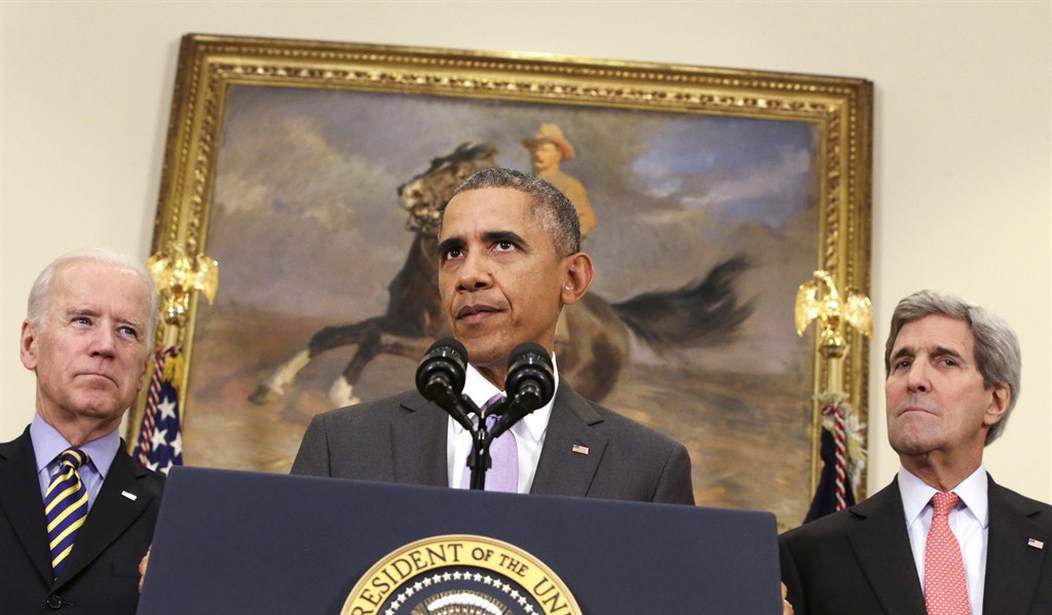When President Obama unveiled his draft of a new Joint Resolution "To authorize the limited use of the United States Armed Forces against the Islamic State of Iraq and the Levant," I was talking with the man who man who is mostly responsible for putting the president in the Oval Office, David Axelrod. (The audio and text of that interview is here.)
Axelrod obviously considers the draw-down of American forces from Iraq to be among if not the single greatest achievement of the president's years in office, and this limp draft AUMF reflects this president's intractable opposition to doing anything that would admit, as I argued to Axelrod, that the president in fact lost the peace that had been achieved in Iraq. That he has lost the peace that was achieved by The Surge and the sacrifice of thousands of Americans is obvious to all but the president's men and women, and thus there is no need to indulge the president's irresolution with regard to the need for a new robust resolution for the next phase of the long war. (See "The War Irresolution" in this morning's Wall Street Journal.)
So what's a Congress to do?
Use this moment to educate the American public about the enemies we face and the nature of the conflict we are in.
Convene a Joint Select Committee for the consideration of the president's request, hold hearings with the very best minds on the ongoing conflict testifying, and then more hearings with witnesses drawn from the very best authorities on war and the Constitution's requirements regarding how to authorize the necessary and many uses of forces in and over the many places where the conflict is likely to carry --from Syria and Iraq, to Yemen and other parts of the Arab world where Islamist extremism spreads, to the parts of Lebanon where Hezbollah holds sway, to Nigeria and Somalia, and of course to Afghanistan and the ungoverned areas of Pakistan, and --if necessary-- to Iran where the world's leading state-sponsor of terror is pretending to dance with America while working away at its terror network spread through Syria, Lebanon and beyond even as it sprints towards nuclear breakout.
Recommended
Who ought to serve on the Joint Select Committee? Combat veterans of this current war as well as the best Constitutional lawyers among the House and Senate memberships. Add in any very well respected member who carries weight on both sides of the aisle as a representative or senator of seriousness and capacity, and one member of the leadership in each house. The numerical advantage should be significantly titled towards the GOP reflecting the country's opinion on the president's administration as expressed in the last election, and the witness list should range far and wide across the experts who have been at the center of the storm since it broke in 2001.
This authorization might best be a Declaration of War against Islamic Extremism, or it might be the consensus of the select committee to call it something else. But it should not be limited to three years as President Obama has almost laughably proposed, and it ought not to use a name dictated by one branch of the enemy, a branch which has already renamed itself though the president for whatever reason refuses to note as much, expressing again his indifference to the realities of the long war.
This process and such a committee would be an extraordinary moment for Americans, and its proceedings would certainly dominate great swathes of the news coverage in the next few months as crucial questions are discussed in the open prior to the crafting of the actual legislative language: When if ever should ground forces in large numbers be committed to the battle? When are special forces deployments covered? When are rescue missions authorized, when can drones be deployed? When and how could the president use force to halt the transfer or suspected transfer of WMD from one state to another or to a third party? When and how could the president order a strike on Iran's nuclear facilities?
All these questions and more need to be answered by the Congress, which has the authority of the Constitution to make these calls. The president has opened the door and called on the Congress to act. It should, just not in the way the president suggests.

























Join the conversation as a VIP Member